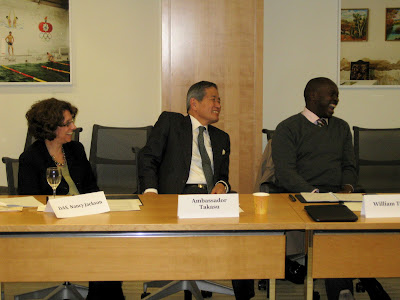May 8, 2012
This month's Conflict Prevention & Resolution Forum (CPRF) organized by Search for Common Ground (SFCG) and 3P took place on May 8th at Johns Hopkins SAIS. The forum addressed the evolving concepts of human security, civilian protection, community safety, and citizen security which are taking shape in various contexts.
Panelists described how the United Nations, the U.S. government and civil society organizations (CSOs) are operationalizing "human security" and related terms in their work and structures. The panel also discussed various terminologies emerging from each context and examined the similarities and differences between approaches.
This event is a part of the Conflict Prevention and Resolution Forum (CPRF) series.
Speakers:
Ambassador Yukio Takasu
Special Adviser on Human Security to the United Nations Secretary-General
Mary Kaldor
Director, Civil Society and Human Security Research Unit at the London School of Economics
Sean McFate
Assistant Professor, Department of International Security Studies at the National Defense University
William Tsuma
Program Manager, Preventive Action and Human Security at the Global Partnership for the Prevention of Armed Conflict (GPPAC)
Moderator:
Lisa Schirch
Director, 3P Human Security
High-Level Roundtable on Human Security
An afternoon rountable discussion was hosted by the Connect U.S. Fund and co-sponsored by 3P Human Security, the Global Partnership for the Prevention of Armed Conflict (GPPAC), the Alliance for Peacebuilding (AfP), and the Prevention and Protection Working Group (PPWG). The discussion featured panelists from the morning event as well as representatives from the State Department, CIVIC Worldwide and the World Bank. The high level meeting provided an opportunity for representatives from diverse sectors to see how other institutions are operationalizing human security frameworks, in some cases for the first time. 3P will publish a report later this summer based on the outcomes of this conversation, laying out the different conceptions being used by different parts of the U.S. government, inter-governmental institutions like the U.N. and World Bank, and international civil society organizations.
This month's Conflict Prevention & Resolution Forum (CPRF) organized by Search for Common Ground (SFCG) and 3P took place on May 8th at Johns Hopkins SAIS. The forum addressed the evolving concepts of human security, civilian protection, community safety, and citizen security which are taking shape in various contexts.
Panelists described how the United Nations, the U.S. government and civil society organizations (CSOs) are operationalizing "human security" and related terms in their work and structures. The panel also discussed various terminologies emerging from each context and examined the similarities and differences between approaches.
This event is a part of the Conflict Prevention and Resolution Forum (CPRF) series.
Speakers:
Ambassador Yukio Takasu
Special Adviser on Human Security to the United Nations Secretary-General
 |
| Mary Kaldor, London School of Economics |
Director, Civil Society and Human Security Research Unit at the London School of Economics
Sean McFate
Assistant Professor, Department of International Security Studies at the National Defense University
William Tsuma
Program Manager, Preventive Action and Human Security at the Global Partnership for the Prevention of Armed Conflict (GPPAC)
Moderator:
Lisa Schirch
Director, 3P Human Security
 |
| William Tsuma, GPPAC |
High-Level Roundtable on Human Security
An afternoon rountable discussion was hosted by the Connect U.S. Fund and co-sponsored by 3P Human Security, the Global Partnership for the Prevention of Armed Conflict (GPPAC), the Alliance for Peacebuilding (AfP), and the Prevention and Protection Working Group (PPWG). The discussion featured panelists from the morning event as well as representatives from the State Department, CIVIC Worldwide and the World Bank. The high level meeting provided an opportunity for representatives from diverse sectors to see how other institutions are operationalizing human security frameworks, in some cases for the first time. 3P will publish a report later this summer based on the outcomes of this conversation, laying out the different conceptions being used by different parts of the U.S. government, inter-governmental institutions like the U.N. and World Bank, and international civil society organizations.
(Left to right): Acting Deputy Assistant Secretary of State for Population, Refugees, and Migration (PRM), Nancy Jackson; U.N. Secretary General Special Adviser on Human Security, Ambassador Yukio Takasu; GPPAC Program Manager for Preventive Action and Human Security, William Tsuma




